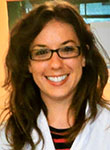Lindsay Springer wins top grad student food chemistry prize
By Blaine Friedlander

Lindsay Springer, an accidental wine expert and graduate student in the field of food science, won the Graduate Research Award March 24 for her studies on the effects of proteins limiting tannins in red wine quality. The American Chemical Society’s Division of Agricultural and Food Chemistry presented the prize.
The competition – which touts talented graduate students to prospective employers – is open to all graduate students (within a year of earning their degree) from colleges that offer food and agricultural chemistry. From this international pool, the Division of Agricultural and Food Chemistry committee selected six finalists to present at the American Chemical Society meeting in Denver, Colorado.
Springer presented “Of Terroir and Tannins: The Role of Pathogenesis-Related Proteins in Red Wine Astringency.”
“As a graduate student majoring in food chemistry, the award from ACS is truly encouraging and inspiring,” Springer said. “Experiences like this are extremely motivating and keep me working hard to do great things with chemistry.”
Making wine began as a hobby for Springer, who now uses New York’s wine trail and Cornell’s viticulture and enology program to pave her career path. She switched graduate study from biomaterials and pharmaceutical science to examine the chemistry of wine. In her research, she found that certain proteins can limit the extraction and addition of condensed tannins, which are critical components for wine quality and “mouthfeel characteristics.”
Tannin extraction from grapes varies by cultivar and region. “My research has identified several pathogenesis-related grape proteins that are stable in wine and that can efficiently bind and remove tannin,” Springer said in a College of Agriculture and Life Sciences newsletter. The relationship between protein and wine tannin quantities indicates that these proteins are important determinants of red wine quality, she explained.
Gavin L. Sacks, associate professor food science, serves as Springer’s adviser and was delighted at the news from the American Chemical Society meeting. “It’s good to see Lindsay’s accomplishments acknowledged by the general food chemistry community,” Sacks said. “It’s exciting to see that work in our growing cool-climate enology and viticulture program may have impact in understanding climactic effects on grape qualities in other regions like California.”
Media Contact
Get Cornell news delivered right to your inbox.
Subscribe